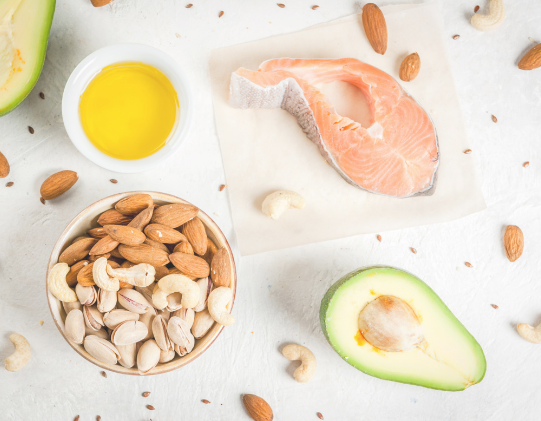
Detox Your Life: 4 Top Tips
March 2, 2024
Vitamin D FAQ
March 4, 2024
Most people know that omega-3 fatty acids are important and that you should be eating fish like salmon. But, what’s the deal with omega-6 fatty acids? Do you need them too?
Just like the well-known omega-3s, omega-6s are vitamin-like essential fatty acids. Your body needs them and cannot produce them on its own. So, you must get them through your diet — food, supplementation, or a combination of the two.
However, the way our diets have evolved in the past few decades, we aren’t lacking in omega-6s. In fact, we’re drastically overconsuming them. In reality, omega-3 insufficiency is common in people of all ages in the United States.(1)
Omega-6 and Omega-3 Fatty Acids
While omega-6 fatty acids are important, a deficiency or inadequacy is nearly impossible. Diets rich in minimally processed, nutrient-dense plant-based foods, particularly nuts and seeds will provide more than enough.
Though, as mentioned above, dietary changes over the last several decades cause most people to drastically overconsume omega-6 fatty acids. These are typically found in foods as linoleic acid, and this shift has been attributed to many health issues.
Currently, the average ratio for Americans is 25:1 (omega-6 to omega-3), that’s significantly more omega-6 than omega-3. When omega 6 levels are higher than omega 3, it’s a recipe for inflammation.
Why It Matters
Excessive intake of omega-6 fatty acids are linked to an increase in virtually all inflammation-related conditions including:
- Cardiovascular disease
- Diabetes
- Obesity
- Metabolic syndrome
- Irritable bowel syndrome
- Rheumatoid arthritis
- Asthma
- Mental illness
- Autoimmune disease
- Accelerated aging(2,3,5,6)
Omega 6 fats are commonly found in many processed foods like crackers, cookies, chips, cereals, fried foods and fast food.
The Cause of Omega-6 / Omega-3 Imbalance
The heavy imbalance of omega fatty acids can be explained by a decrease in freshwater fish consumption and the increased intake of processed foods. (7) Partly to blame is actually a marketing ploy that we have been taken in by. For years now, we have been told to substitute industrial vegetable oils rich in these polyunsaturated fatty acids for animal fats high in saturated fatty acids.(8) A good example is the recommendation to substitute margarine (laced with omega-6-rich vegetable oils) for butter.
However, in the Sydney Diet Heart Study, a group of researchers from the National Institutes of Health found that this advice is heavily misguided. They concluded that “substituting dietary linoleic acid in place of saturated fats increased the rates of death from all causes, coronary heart disease and cardiovascular disease.” (9)
Another particularly important finding of this study was that substituting omega-6 fats for saturated fats did decrease blood cholesterol levels. However, that decrease in cholesterol resulted in no evidence of cardiovascular benefit; in fact, it led to the opposite effect: an increase in cardiovascular disease and coronary heart disease.
Balance Your Omegas
Omega-6 fatty acids are still important and you’ll get plenty if you consume a diet rich in minimally-processed, nutrient-dense whole foods. However, it’s not just about reducing your intake of omega-6s. You also need to make a conscious effort to increase your consumption of omega-3s. This will support healthy levels of inflammation, cellular health, and optimal overall health. If you need supplementation, learn about high quality brands and other highly recommended supplements here.
For more tips and the latest and greatest in health optimization, follow me on Instagram.
Sources
- Kubala, Jillian, Omega-3 Insufficiency in the U.S., 2020 Aug 19. Available from: https://www.healthline.com/health/nutrition/omega-3-insufficiency-in-the-u-s#role-of-omega-3-s
- Patterson E, Wall R, Fitzgerald GF, Ross RP, Stanton C. Health Implications of High Dietary Omega-6 Polyunsaturated Fatty Acids. J Nutr Metab. 2012;2012:1–16.
- Simopoulos AP. An Increase in the Omega-6/Omega-3 Fatty Acid Ratio Increases the Risk for Obesity. Nutrients [Internet]. 2016 Mar 2 [cited 2018 Nov 27];8(3). Available from: https://www.ncbi.nlm.nih.gov/pmc/articles/PMC4808858/
- Arterburn LM, Hall EB, Oken H. Distribution, interconversion, and dose response of n-3 fatty acids in humans. Am J Clin Nutr. 2006 Jun;83(6 Suppl):1467S-1476S.
- Hibbeln JR, Nieminen LRG, Blasbalg TL, Riggs JA, Lands WEM. Healthy intakes of n-3 and n-6 fatty acids: estimations considering worldwide diversity. Am J Clin Nutr. 2006 Jun;83(6 Suppl):1483S-1493S.
- Cassidy A, De Vivo I, Liu Y, Han J, Prescott J, Hunter DJ, et al. Associations between diet, lifestyle factors, and telomere length in women. Am J Clin Nutr. 2010 May 1;91(5):1273–80.
- Blasbalg TL, Hibbeln JR, Ramsden CE, Majchrzak SF, Rawlings RR. Changes in consumption of omega-3 and omega-6 fatty acids in the United States during the 20th century. Am J Clin Nutr. 2011 May 1;93(5):950–62.
- CCMMCPAH. Dietary fat and its relation to heart attacks and strokes. Report by the Central Committee for Medical and Community Program of the American Heart Association. JAMA. 1961 Feb 4;175:389–91.
- Ramsden CE, Zamora D, Leelarthaepin B, Majchrzak-Hong SF, Faurot KR, Suchindran CM, et al. Use of dietary linoleic acid for secondary prevention of coronary heart disease and death: evaluation of recovered data from the Sydney Diet Heart Study and updated meta-analysis. BMJ. 2013 Feb 4;346(feb04 3):e8707–e8707.




